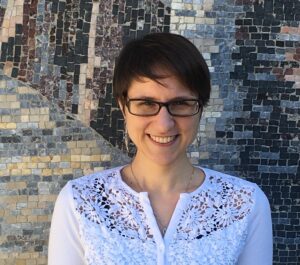The Others. Looking for diversity in Euboean linguistic ecosystems
 The purpose of my research at CHS is to develop an interdisciplinary model to achieve a fitting description of complex linguistic environments (‘ecosystems’) and their diachronic evolution. In particular, I am interested in understanding how the same Ancient Greek dialect could change in different ways under the pressure of different social and political factors. The motherland and the colonies offer the best vantage point from which to study this issue.
The purpose of my research at CHS is to develop an interdisciplinary model to achieve a fitting description of complex linguistic environments (‘ecosystems’) and their diachronic evolution. In particular, I am interested in understanding how the same Ancient Greek dialect could change in different ways under the pressure of different social and political factors. The motherland and the colonies offer the best vantage point from which to study this issue.
Among Greek dialects, Euboean – a dialect of the Attic-Ionic group – stands out for its geographical diffusion. Evidence of this dialect is found in Euboea, Oropos, the Chalcidian peninsula, Italy and Sicily. Epigraphic remains from Euboean settlements also stand out on account of their age. The most ancient ones – e.g., Nestor’s cup in Pithekoussae or some ancient graffiti in Eretria – belong to the last quarter of the 8th c. BCE. This unique configuration makes it possible to study almost in parallel how this dialect changed in Euboea and in her colonies, where intralinguistic and extralinguistic factors were different from those in the motherland.
Interacting in a bi- or even plurilingual environment was part of everyday life for many ancient people. Achieving a fitting description of multilingual environments implies both relying on traditional dialectological approaches and going beyond them. Traditionally, Greek dialectology focuses on the genetic relationships between dialects (to which group a dialect belongs) and on common areal developments (which common features arose independently from genetic relationship). However, this kind of approach does not tell us much about everyday linguistic exchanges between people in a specific place. Were there people speaking other Greek dialects or other – i.e. non-Greek – languages? How significant was their impact, if any, on different levels of communication (e.g. official or private)? So, let “The Others” speak!
Languages are natural as well as cultural products. As such they reflect the history of their speakers: from neologisms to loanwords, from purist aspirations to language extinction, a language retains a memory not only of the events and situations which its speakers have experienced, but also of their reactions to them. Even ignoring or trying to avoid other dialects or languages is a linguistic choice that tells us much about ancient speakers’ attitudes.
An approach which includes “The Others” can enable us to look at ancient linguistic evidence with new eyes. Documents which were not written in the local dialect and alphabet can provide proof of the presence of strangers and tell us to what degree they were (or wanted to be) integrated, if they were politically or culturally dominant etc. Metrical inscriptions, which often display a mixed language (and therefore are often not taken into consideration in dialectological studies), can reveal much information about local poetic traditions and non-local literary influences. Onomastic choices can shed light on the compromises made between two cultures or disclose ancient views on the prestige of local or non-local traditions. In the case of short inscriptions, we can even discover that they make more sense if interpreted not in what is traditionally considered the local official alphabet, but in an another one (which could be local as well).
I cannot tell you how lucky I feel to have the opportunity to implement a part of this project at the Center for Hellenic Studies in Washington DC. Everyone here is working to make it possible for fellows to go further with their own research in a friendly environment. The exchanges with other fellows and other researchers are extraordinary opportunities for me to broaden my view on antiquity and beyond. In fact, stimulating challenges by nature come from researching “The Others”!
Francesca Dell’Oro
Francesca Dell’Oro is an associate researcher at the University of Lausanne. She studied Historical Linguistics and Classical Philology at the University of Milan (2004) and obtained a PhD in Philology and Linguistics from the University of Chieti-Pescara (2008). She was a post-doctoral fellow at the Universities of Zurich (2008-2015) and Oxford (2011) and a non-tenured professor in Classics and Linguistics at the University of Grenoble Alpes (2013-2015). She has published a monograph about the history of the ‘Caland’ notions (Leggi, sistemi e leghe suffissali ‘di Caland’: Storia della questione ‘Caland’ come problema teorico della linguistica indoeuropea, Innsbruck, 2015). She is currently preparing a new edition of the lead tablets from Styra (Euboea) with palaeographic, linguistic and onomastic commentaries. She is also writing a monograph on the Euboean dialect paying special attention to contact phenomena in the motherland and in the colonies as well as the development of specific colonial dialectal features. The purpose of her research at CHS is to develop an interdisciplinary model, based on sociolinguistics, epigraphy and history, in order to achieve a fitting description of complex linguistic environments like those of the Euboean-speaking areas between the 8th and the 4th century BCE.
